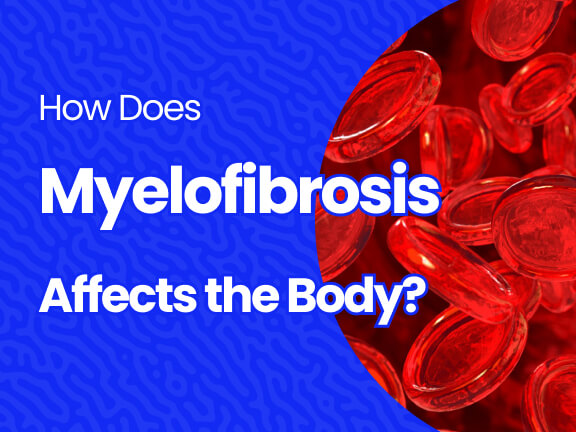How Does Myelofibrosis Affect the Body?
A diagnosis of myelofibrosis can be concerning, especially when many people have no symptoms at first. Myelofibrosis is a dangerous condition that scars the bone marrow, stopping it from producing healthy blood cells, whether or not you have symptoms.
Myelofibrosis is an uncommon type of blood cancer that belongs to the myeloproliferative neoplasms group of diseases (MPN). It mostly affects the elderly, and it’s usually discovered during a standard checkup.
Many persons with the illness now have a better prognosis thanks to advancements in treatment. However, it’s tough to predict how your life will alter once you’ve been diagnosed. The course of the disease and the prognosis differ greatly from one person to the next.
Tiredness
Symptoms of myelofibrosis may appear gradually. However, as the illness interferes with creating blood cells, you may get more fatigued. Anemia, or a decreased red blood cell count, is the cause of fatigue.
Your ability to work may be impacted by fatigue. Many people with myelofibrosis choose to cut back on their work hours or retire early. If possible, request that your boss allows you to work from home, or take frequent breaks during the workday.
With home duties, seek the support of family or friends, or hire a cleaning service.
Blood transfusions can help with tiredness and weakness by increasing your red blood cell count. Receiving red blood cells from a compatible donor is the basis of a blood transfusion.
This technique can help to alleviate symptoms immediately.

Sleep Issues
Night sweats and sleeping problems are common in people with myelofibrosis. It’s a good idea to develop proper sleep hygiene to combat insomnia.
For instance, you may try:
- Going to bed and waking up at the same time
- Avoiding caffeine near bedtime.
- Only spending time in bed if you’re planning on sleeping.
- At night, stay away from bright screens from electronics.
- Maintaining a dark and cool environment in your bedroom
- Before going to bed, try listening to soothing music, meditating, or taking a soothing bath.
- Minimizing alcohol consumption in the evenings
,as it can disrupt sleep
Sleep aids or supplements prescribed by your doctor may also help you achieve a good night’s sleep.
Pain
Myelofibrosis can cause discomfort by causing inflammation of the tissue around the bones and the hardening of the bone marrow.
An enlarged spleen, which is frequent in myelofibrosis patients, can also cause pain by putting pressure on the abdomen.
Gout, a condition in which the body’s uric acid builds up and crystallizes in the joints, can be caused by myelofibrosis. . Swollen, painful, and inflammatory joints can occur.
Depending on the cause of pain, there are a variety of therapy options available. Your doctor may suggest one of the following treatments for an enlarged spleen:
- ruxolitinib (Jakafi)
- hydroxyurea (a type of chemotherapy)
- interferon alfa
- thalidomide (Thalomid)
- lenalidomide (Revlimid)
- radiation therapy
If none of these approaches work, your spleen may need to be removed surgically. A splenectomy is the medical term for this procedure. However, there are hazards associated with this operation, including blood clots, infection, and liver enlargement.
Stress
Any chronic illness diagnosis can cause mental distress. It’s critical that you get the help of family, friends, or a support group. To deal with your feelings, you might wish to consider counseling.
Making an appointment with a nurse or social worker can help you understand how a cancer diagnosis will influence your life and guide you in the appropriate path for assistance.
You can also make an appointment with a licensed mental health practitioner like a counselor or psychologist.
You can also manage stress by making a few simple lifestyle modifications. Meditation, yoga, gardening, light hiking, and listening to music can all assist to boost your mood and overall well-being.
Coping with Side Effects
Even if you don’t have any symptoms at first, a diagnosis of myelofibrosis will most certainly impact your life in various ways.
Initially, this may involve changing your diet, visiting the doctor more frequently for checkups, and joining a support group.
It could involve dealing with new symptoms like fatigue or discomfort later in your disease’s course, trying different medications, or having surgery. Treatments for myelofibrosis attempt to alleviate symptoms and complications, improve your quality of life, and improve your attitude.
A social worker or support group can help you handle the emotional side effects, while your doctor can assist you in choosing a treatment plan.
To learn more about Myelofibrosis, read our ultimate guide: Myelofibrosis Ultimate Guide
Sources:












